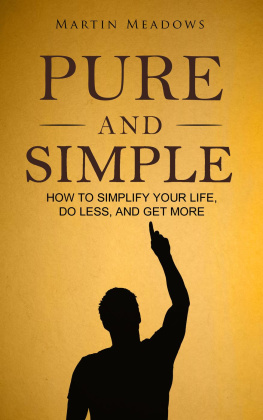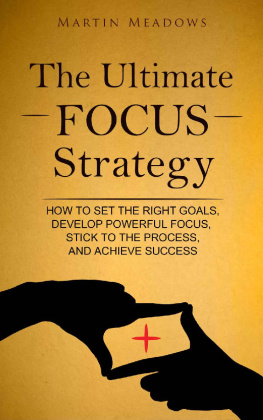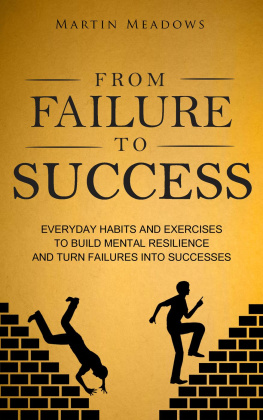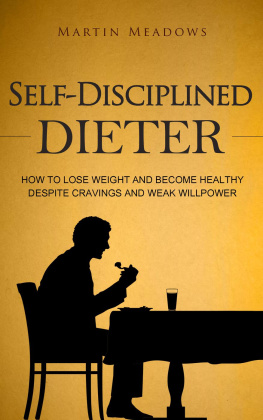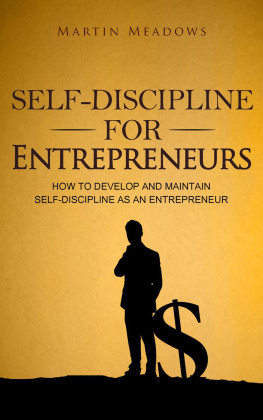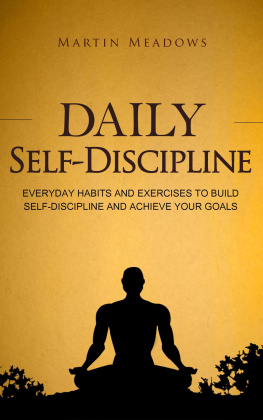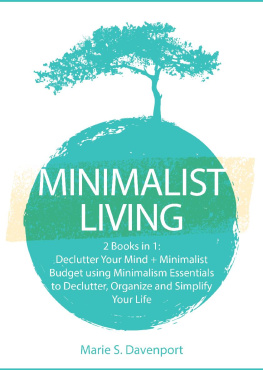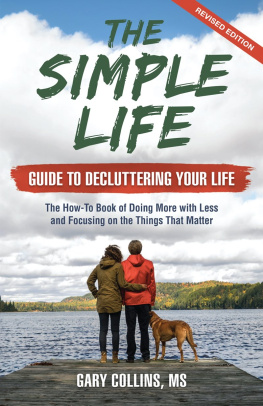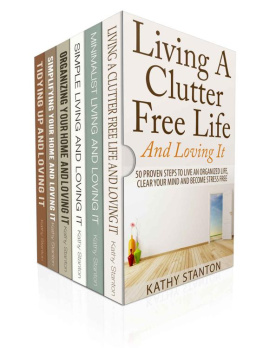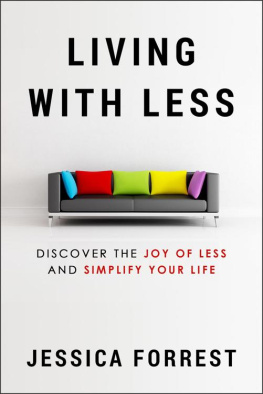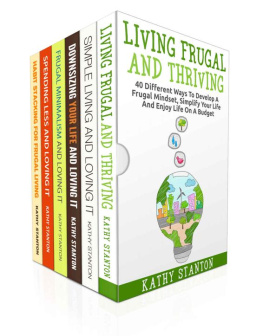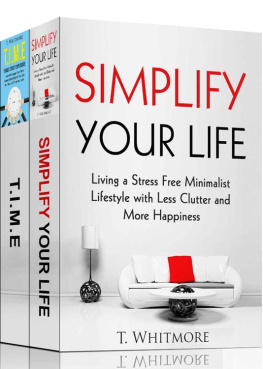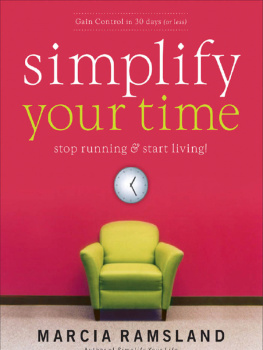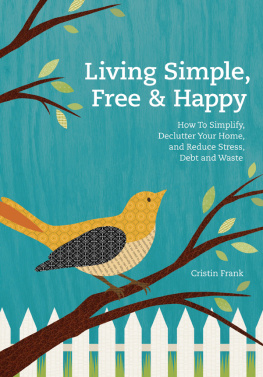
Pure and Simple
How to Simplify Your Life,
Do Less, and Get More
By Martin Meadows
Download another Book for Free
I want to thank you for buying my book and offer you another book (just as long and valuable as this book), Grit: How to Keep Going When You Want to Give Up , completely free.
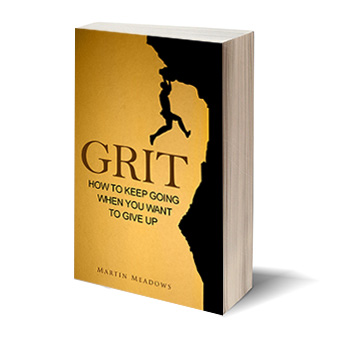
C lick the link below to receive it:
http://www.profoundselfimprovement.com/pureandsimple
In Grit , Ill share with you exactly how to stick to your goals according to peak performers and science.
In addition to getting Grit , youll also have an opportunity to get my new books for free, enter giveaways, and receive other valuable emails from me.
Again, heres the link to sign up:
http://www.profoundselfimprovement.com/pureandsimple
Table of Contents
Prologue
W hen I heard about the 80/20 Principle for the first time (from Richard Kochs book The 80/20 Principle [i] ), I didnt fully understand its implications. The most common example was: 80% of your profits come from 20% of your clients. That was easy enough, but didnt sound practical for everyday use except for business.
It took me a few years to grasp the full meaning and impact of this rule and the power of simplification implemented on a daily basis.
Simplification started making more sense each time I cut away the unessential and got better results while doing less. Soon, I made it my number one rule in life.
This book wont explain in detail the 80/20 Principle or its implications in business. We wont discuss statistics or talk about theory.
Instead, the goal of this book is to help you escape the trap of complexity by learning how to focus on the vital few instead of the trivial many. Ill show you why you should trim away the fat in your life and how to do it.
Once you finish the book, youll have a better idea how to reduce or eliminate the activities that dont bring value in your life. Youll be able to enjoy the simplicity and, most importantly, stick to it instead of defaulting to complexity once again.
Just like maintaining a healthy weight requires healthy habits, living a simplified life requires maintaining a few simple habits, too. Youll discover the most important question to ask yourself each time you want to add something in your life. Youll also increase your life satisfaction by making a simple switch in your priorities and acquire a powerful skill for virtually unlimited achievement.
As in my every book, I point to numerous resources and scientific research to base the advice and claims on something more than just my subjective opinion. However, the book as every book in this genre is still based primarily on my views and ideas which you may or may not agree with. My goal is to help you reconsider how you live your life, not tell you how you should live it, as the answer varies for each person.
Each chapter ends with a quick recap to help you review it. If youre after getting the most knowledge in as little time as possible, you dont need to read the entire book. 80% of its value will be found in these short chapter summaries. If, however, you want to have a more enjoyable reading experience, I invite you to follow me through every single chapter.
Chapter 1: The Power of Fewer Choices
L ets start with a quick exercise. Please come up with a general outline for a short story in your mind. It can be about anything you want. Nothing constraints you. Who are the characters? What do they do? Whats the conflict?
How difficult do you find it to come up with something on the spot?
Now come up with a short romance story taking place in a small town between a local doctor and his patient.
How difficult was it to come up with a quick storyline with these constraints?
I bet you could imagine a scene between the doctor and the patient right away.
Thats the power of exclusion and constraint. Logic says youll be more creative if I tell you that you can come up with anything you want. Yet, its when I limit your choices you become more imaginative.
Constraints not only make you more creative, they also help you make better decisions that will leave you more satisfied.
In a famous study conducted by Sheena Iyengar from Columbia University and Mark Lepper from Stanford University, participants who were offered 24 or 30 choices of jams were ten times less likely to make a purchase than the participants who were offered a choice of 6 jams[ii]. Moreover, participants were more satisfied with their selections when they had a limited set of options.
Their findings dont only apply to choosing between different jams. Fewer choices in general dramatically reduce the complexity in our everyday lives and make the final choice more satisfying.
A study on the number of product capabilities conducted by the researchers from the University of Maryland[iii] shows that overly complex products lead to feature fatigue, which reduces the users satisfaction.
The results of the study show that companies should offer a large number of specialized products instead of one product with an overwhelming number of features (if you have ever used customer management software, you can probably relate to that).
The availability of endless options should give us more freedom. Usually its the other way around. Trying to choose between numerous options causes unnecessary stress and unhappiness.
Analysis paralysis, the state of over-analyzing a situation, permeates every single aspect of our lives if we dont know how to deal with it.
Sheena Iyengar and her colleagues conducted another experiment on the harmful effect of too many choices. The team of researchers discovered that employee participation in 401(k) plans fell as the number of fund options was increased[iv]. When there were only two choices, 75% of employees participated. When they were offered 59 options, 61% of employees participated.
I too suffered from a similar problem. When I was looking for a simple savings account offering the best interest rate, I had to compare more than just interest rates. Most offers came with numerous stipulations, making it extremely hard to compare different options. It would take hours just to check every offer, and I would still second-guess my choice afterwards.
In the end, I went with the simplest offer with a lower interest but with no additional provisions. I greatly limited my choice by skipping bank offers with numerous stipulations, and consequently made my choice much easier.
Now that youve discovered how too many choices affect your life negatively, theres a clear path you can consider taking living your life in such a way that your options are always reduced to the most viable ones.
Each area of life comes with different challenges to reduce the number of choices. In the remaining part of this chapter, well go through some of the most important areas of your life and ways to reduce the number of choices.
Everyday Life
I n my book How to Build Self-Discipline: Resist Temptations and Reach Your Long-Term Goals , I mentioned a story of President Obama, who once said in an interview, Youll see I wear only gray or blue suits. Im trying to pare down decisions. I dont want to make decisions about what Im eating or wearing. Because I have too many other decisions to make[v].
Other people who have been known for wearing the same clothes include Facebooks co-founder Mark Zuckerberg (a gray t-shirt with a black hoody and jeans), Steve Jobs (black turtleneck and jeans), and Albert Einstein (a gray suit)[vi]. All of these people decided that the energy spent making a frivolous decision in the morning wasnt worth it.
Next page
